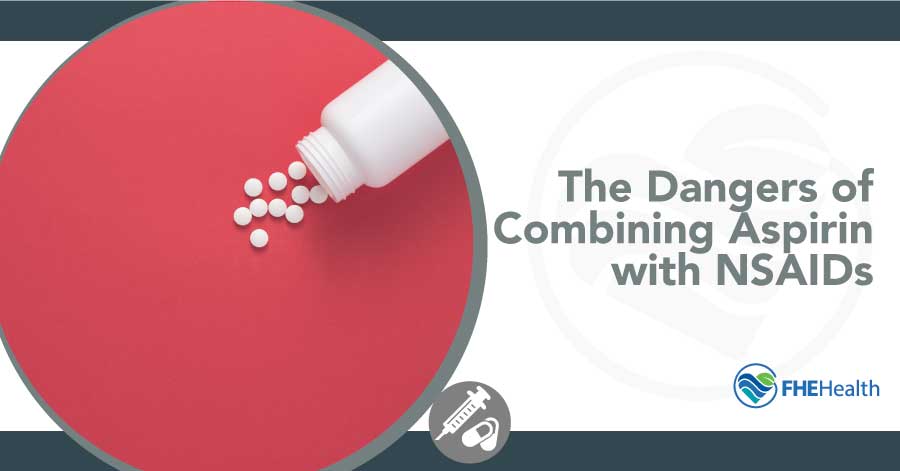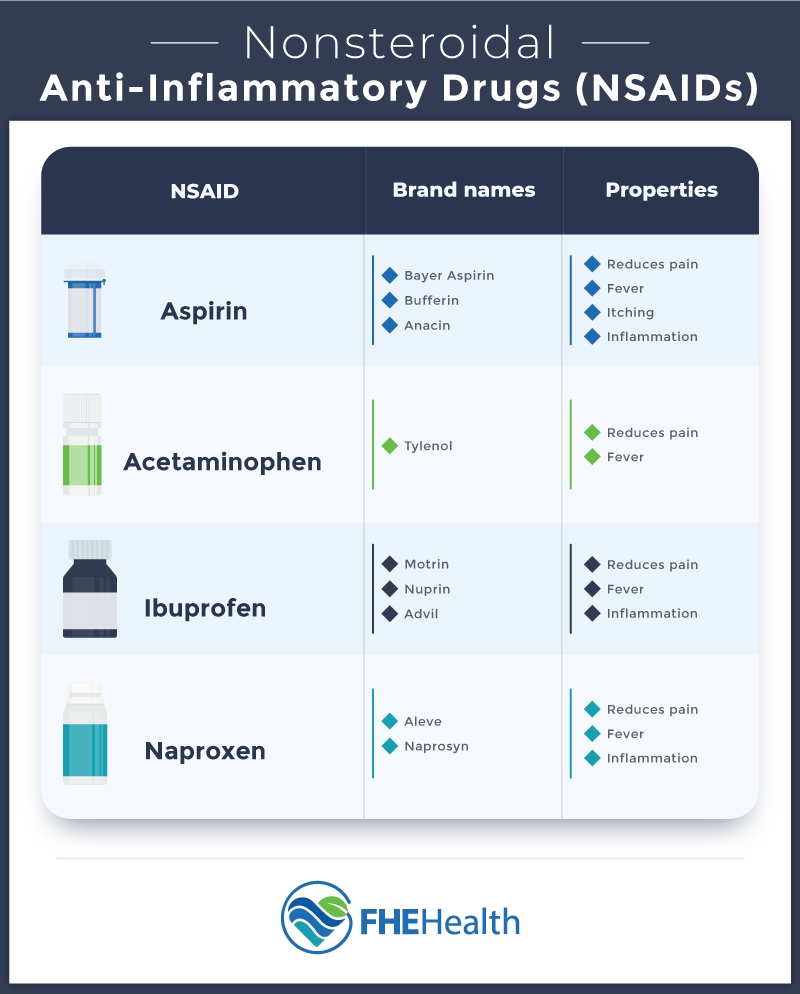
It isn’t unusual to hear of someone taking low-dose aspirin to lower heart attack risk alongside ibuprofen for arthritis. However, even though these two over-the-counter drugs have little risk of side effects on their own, together, they can pose more of a problem. To keep yourself protected, it’s best to arm yourself with the information you need to use these medications safely.
So, can you take aspirin and ibuprofen together? To find out, learn more about these drugs, how they work, and the specific dangers they can pose. For more information on substance abuse and related topics, see our website or reach out. Dr. Beau A. Nelson, DBH, LCSW, FHE Health’s Chief Clinical Officer, shared, “Medications available over the counter, or supplements, or any drug store remedies can still pose a risk and need to be taken with consideration for your personal health. Consult with your physician or with a pharmacist (a great free resource) before taking medications, especially if you are not sure of the dose or interactions with other things you are taking.”
What Are NSAIDs?
NSAIDs, or non-steroidal anti-inflammatory drugs, are commonly prescribed for painful conditions like arthritis. While NSAIDs come in a variety of forms, some over-the-counter and others prescription, the most common ones are aspirin and ibuprofen.
Pain relief is one of the most common uses of NSAIDs, although they’re also effective anti-inflammatory agents and are good at fighting fevers. They also carry the effect of preventing blood from clotting, which can be an advantage or a disadvantage, depending on the situation.
Other side effects of NSAIDs include being more susceptible to bruising, nausea, and ulcers. Females who are pregnant should avoid them, as well as those with high blood pressure, asthma, or a history of liver or kidney disease.
Is Aspirin an NSAID?
Aspirin is an NSAID and is one of the best when taken as a blood thinner, which is why many people use it to protect against heart disease. However, because aspirin has many of the same properties as other NSAIDs, combining it with another can be dangerous.
Why Some People Take Aspirin and Ibuprofen Together
One of the most common uses of aspirin is as a daily low-dose treatment for heart disease. Since many people use the drug daily, they form the impression that it carries very little risk of side effects. This is true in most cases; however, some make the mistake of taking ibuprofen for a headache or arthritis pain too soon after taking their daily heart medication.
The Uses of Aspirin
As mentioned, aspirin offers an array of main benefits that include:
- Pain relief (especially minor aches)
- Anti-inflammatory
- Blood thinner
- Fever reducer
Aspirin is, effectively, among the very first nonsteroidal anti-inflammatory drugs to be discovered. Salicylate, a compound in aspirin, has been used for more than 4,000 years for its medicinal qualities. Salicylate is a compound found in various plants like myrtle and willow trees. The ancient “Father of Modern Medicine,” Hippocrates, prescribed willow bark to reduce fevers and pain. Many cultures still rely on willow bark to treat minor pains and headaches.
Today, medical practitioners rely on aspirin to treat many different health issues in addition to those mentioned above. It’s not uncommon for doctors to prescribe aspirin to reduce symptoms associated with:
- Cold and flu
- Headaches
- Menstrual cramping
- Sprains and strains
- Tooth pain
- Arthritis pain
- Migraines
Physicians may also prescribe aspirin for patients who are at increased risk for cardiovascular events. Aspirin can help prevent blood clots, which are more likely to form in those suffering from:
- Diabetes
- Reduced blood flow to brain
- Heart disease
- Blood vessel problems
- Inflammation of heart
- Retinopathy
- High ‘bad’ LDL cholesterol
- Hypertension
- Swelling
Doctors may also recommend that smokers take an aspirin a day to reduce blood clot risks. Aspirin dosing, of course, depends on the doctor’s recommendations, or people may take it as directed by product instructions.
The Uses of Ibuprofen
Ibuprofen is used to treat a wide range of conditions, including:
- Inflammation
- Headache
- Fever
- Menstrual pain
- Toothaches
- Sprains and strains
- Arthritis pain
- Back pain
- Aches associated with the common cold
In fact, ibuprofen and aspirin are also used to treat many of the same conditions. Many prescription drugs, such as Oxycontin, include ibuprofen in their composition.
Some people may experience side effects after taking ibuprofen. These may include:
- Dizziness
- Feeling anxious
- Bloating
- Headache
- Nausea and vomiting
Severe side effects are not common, but they may include fluid retention, skin rash, tinnitus, and dizziness. It’s important to report side effects to your doctor or healthcare provider. At that point, they are likely to recommend a different medication. People with gastrointestinal problems may also want to choose an alternative to ibuprofen.
Dangers of Aspirin and NSAID Combinations
Since aspirin is also an NSAID, it has the same mechanism of action as drugs like ibuprofen and naproxen. This means that doubling up on these drugs results in getting double the effects and double the side effects.
Among the most serious of these side effects is gastrointestinal problems. This includes an increased risk of bleeding and peptic ulcers. Generally, the risk of these side effects increases as the dosage of either medication increases.
Other Common Side Effects
Combining aspirin and ibuprofen can lead to a range of different side effects, all ranging in severity and duration. If you notice any of the following, be sure to consult your doctor:
- Blistered, peeling, red skin
- Swollen hands and feet
- Pain in the joints of the hands or feet
- Yellow eyes or skin, signs of liver problems
- Blood in urine or coughing up blood
Who’s Most at Risk?
While anybody can suffer from the side effects of combining aspirin and ibuprofen, some people are more at risk than others. Be sure to take extra caution if any of the following describes you:
- Older than 65
- Smoke or drink heavily
- Taking blood thinners
- Already experience gastrointestinal bleeding
- On corticosteroid medications
How Long After Taking Aspirin Can You Take Ibuprofen?
The Food and Drug Administration recommends that you wait at least 8 hours after taking ibuprofen to take an immediate-relief aspirin or that you wait 30 minutes after taking aspirin to take ibuprofen. They also recommend consulting your doctor for more personalized information on how drugs can affect you.
What if I Accidentally Combine the Two Drugs?
If you do happen to accidentally combine aspirin and ibuprofen, don’t panic. In most cases, a single incident won’t lead to long-term side effects. However, to stay safe, monitor yourself closely for side effects. If you notice anything concerning, be sure to consult your doctor without hesitation.
How Can I Take Aspirin and Advil Together?
While taking Aspirin and Advil together isn’t recommended for most people, there are ways to lower the risk for those who feel they need the effects of both drugs.
Choose the Right NSAID
Some NSAIDs are less likely to cause gastrointestinal side effects than others, and understanding the difference is a good way to stay protected. Drugs such as low-dose Celebrex (celecoxib), Disalcid (salsalate), Voltaren (diclofenac), and Mobic (meloxicam) are all good options.
Use Non-NSAID Alternatives and Therapies
Depending on the cause of your pain, there are plenty of other alternatives that can help you avoid mixing NSAIDs. Tylenol can be a good option for pain relief, though it doesn’t have anti-inflammatory effects.
Non-oral drug therapies can be another good choice, as they won’t cause gastrointestinal problems. Analgesic creams are a good way to provide topical relief for rashes and burns. Subdermal patches can be another option to consider.
Talk to Your Doctor
In any case, those wondering, “How can you mix aspirin with ibuprofen?” should consult their doctor first. While not everyone is sensitive to the gastrointestinal side effects these combinations can cause, mixing drugs of any kind can often come with unexpected consequences.
Staying Safe With NSAIDs
In most cases, common NSAIDs like aspirin and ibuprofen pose very little risk to those who use them. However, they can be a good example of how important it is to remain mindful of the drugs we use regularly. As long as you’re aware of the effects of the medications you’re using and take them as prescribed, you have little to fear.
If you’re looking for more information on the effects of NSAIDs or other topics relating to substance abuse, get in touch. FHE Health has over 15 years of experience working with the medical aspect of addiction. With a talented multidisciplinary team, we provide our patients with top-level care and attention.
Common Questions About Combining Aspirin and NSAIDs
Q: Can I take aspirin and ibuprofen at the same time?
A: We advise you not to. Since aspirin is technically an NSAID itself, taking it with ibuprofen is essentially doubling your dose. You aren’t doubling the pain relief, but you are doubling the risk of stomach irritation, ulcers, and bleeding.
Q: I take a daily baby aspirin for my heart. Can I still take Advil for a headache?
A: Yes, but be sure to watch the clock. The FDA suggests waiting at least 30 minutes after taking your aspirin to take ibuprofen. If you take the ibuprofen first, you need to wait a full eight hours before taking your aspirin. If you don’t time it right, the ibuprofen can actually block the heart-protecting effects of the aspirin.
Q: What is the safest alternative for pain relief if I’m already on aspirin?
A: Tylenol (acetaminophen) is usually your best bet. It isn’t an NSAID, so it doesn’t thin your blood or attack your stomach lining the way ibuprofen does. If you want to avoid pills entirely, look into analgesic creams or patches to treat the pain locally.
Q: Is aspirin actually considered an NSAID?
A: Yes. Most people think of it strictly as a blood thinner or heart medication, but it belongs to the exact same drug class as Aleve and Advil.
Q: I accidentally took both today. Should I go to the ER?
A: Don’t panic! A single incident is rarely dangerous and likely won’t cause long-term damage. Just keep an eye out for stomach pain, dizziness, or nausea. If you feel fine, just get back on the proper schedule tomorrow. If you notice blood in your urine or feel severe abdominal pain, call your doctor.
Q: Who is most at risk for side effects?
A: People over 65 are much more susceptible to gastrointestinal bleeding. You also need to be careful if you smoke, drink heavily, or take corticosteroid medications.
Q: What are the signs that I’ve taken too much?
A: Your stomach will usually tell you first. Watch for nausea, vomiting, or a burning sensation in your abdomen. More serious signs include black or bloody stools, yellowing of the skin (jaundice), or ringing in the ears (tinnitus).







